Techniksoziologie der Nicht-/Benutzung: Jun.-Prof. Susann Wagenknecht, PhD (#SW1)
Format
Projektseminar, das synchrone und asynchrone Formen kombiniert
Schlagworte
Soziologie, Forschungsprojektseminar, Opal-Blog, Lehrvideos, Videokonferenzen
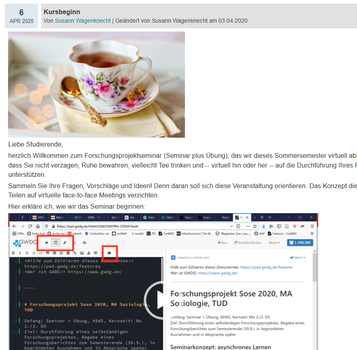
© Susann Wagenknecht
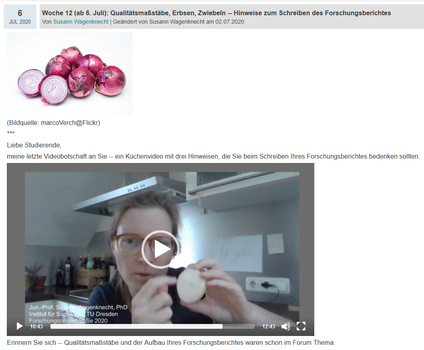
© Susann Wagenknecht
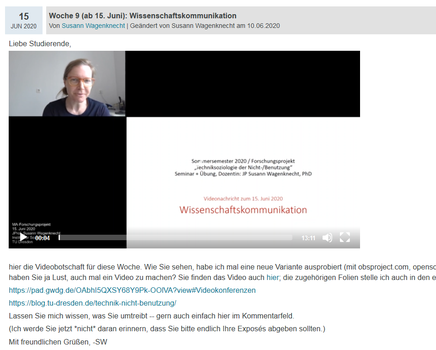
© Susann Wagenknecht
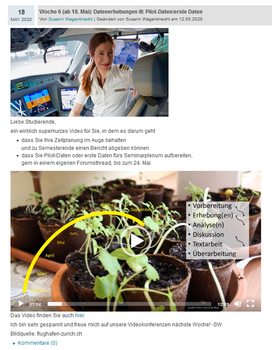
© Susann Wagenknecht
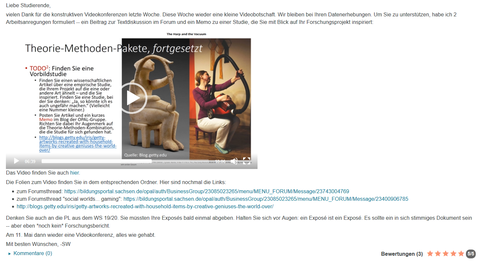
© Susann Wagenknecht
Beschreibung
Inhaltlich:
Only two professions refer to their clients as users: designers and drug dealers. It is perhaps not surprising, then, that some of the language used to describe technology (non)use draws on that of substance abuse, indulgence, and addiction.” (Baumer et al. 2015: 54)
Technik soll nützlich sein, und sie macht uns tatsächlich oft in erstaunlich kurzer Zeit zu NutzerInnen, die von ihrem Funktionieren abhängig sind. Technik zu benutzen, ist herkömmlich und naheliegend. Aber Benutzung ist nur eine mögliche, hochgradig normierte Form der Bezugnahme auf technische Arrangements. Andere Bezugnahmen sind möglich: Technik lässt sich nicht be-, sondern auch abnutzen oder abstellen, sie lässt sich hacken, um- oder auseinanderbauen. Technik lässt sich auch einfach – einfach? – nicht benutzen.
Dieses Kernseminar untersucht und problematisiert das Paradigma des Nutzers und der Benutzung. Es geht in diesem Seminar darum, die Vielfalt praktischer Bezugnahmen auf technische Arrangements zu erforschen, von instrumentell bis subversiv, von vorbildlich bis provokant, von aktiv bis tatenlos. Es geht darum zu verstehen, wie das Design technischer Artefakte ein Script für ihre Nutzung transportiert und wie sich dieses Script deskribieren lässt. Wann erscheint der Gebrauch bestimmter Technologien alternativlos, und wie lässt sich mit dieser scheinbaren Alternativlosigkeit umgehen? Welche Formen von Sozialität vermittelt der Gebrauch von Technik, und welche sozialen Konsequenzen hat ihre Nicht-Benutzung? In welchen Praktiken ist Technikgebrauch eingebettet und welche Praktiken können Nicht-Benutzung ‚auffangen‘?
Diese Fragen nehmen Dynamiken von In- und Exklusion in Augenschein, sie fokussieren auf Machtverhältnisse und rücken auch jene Dritten in das Blickfeld, die bei einem allzu engen Fokus auf Technik und ihre Nutzung unbeachtet bleiben. Denn: Wer benutzt hier eigentlich wen? Angesichts ausgefeilter Methoden zur Überwachung von Konsumenten schlägt Eric Baumer (2015) vor, den ‚Usern‘ begrifflich nun die „usees“ beiseite zu stellen. Und Janet Vertesi (2014) konstatiert: “Many people say that the solution […] is simple: if you don’t like it, just opt out. But as my experience shows, it’s not as simple as that. And it may leave you feeling like a criminal.”
Das Seminar ist dazu angelegt, Studierende des Soziologie-Masters bei der Durchführung selbständig konzipierter, qualitativ-empirischer Forschungsprojekte zu unterstützen.
Literatur:
- Baumer, Eric, Jenna Burrell, Morgan G. Ames, Jed R. Brubaker und Paul Dourish (2015): On the importance and implications of studying technology non-use. interactions 22(2), S. 52-56.
- Baumer, Eric (2015): Usees. Proceedings of the 33rd Annual ACM Conference on Human Factors in Computing Systems, S. 3295-3298.
- Vertesi, Janet (2014): My Experiment Opting Out of Big Data Made Me Look Like a Criminal. Time, May 1, 2014. https://time.com/83200/privacy-internet-big-data-opt-out/
Kurzbeschreibung des virtuellen Lehrformates:
Die Lehrveranstaltung nutzte die Blog-Funktion in Opal-Gruppen, um das Seminar in wöchentlichem Rhythmus zu organisieren. Der Blog des Seminars beinhaltete jedoch nicht nur Video-Beiträge der Dozentin und Hinweise auf anstehende Videokonferenzen, sondern auch Kommentare der Studierenden. Der Blog organisierte den Wechsel asynchroner und synchroner Lehr-Lern-Formen—jede Seminarwoche fand entweder eine Videokonferenz statt oder die Studierenden erhielten ein vorab produziertes Video, ergänzt um Arbeitsanregungen für die Einzel- oder Gruppenarbeit. Zusätzlich griff die Lehrveranstaltung auf weitere Tools zurück:
- Die Forum-Funktion in OPAL, die Studierende nicht nur für Fragen, Hinweise und „Memos“ zum Projektverlauf nutzten, sondern auch für den Austausch von Literatur und die Planung selbstorganisierter Schreibgruppen
- Die Ordner-Funktion in OPAL, die die Lehrveranstaltung für den schriftlichen Austausch von Skizzen und Zwischenständen nutzte
- Ein externes Etherpad für die gemeinsame Seminarplanung, die über das Semester laufend an den Fortgang der Forschungsprojekte angepasst wurde
- Ein Opal-externer TUD-Blog, auf dem Studierende ihre Forschungsergebnisse präsentieren können
Ansprechpartner
jun.-Prof. Susann Wagenknecht, PhD
Abstimmungskennung
#SW1





